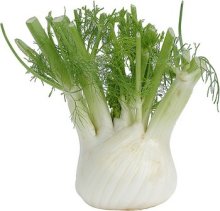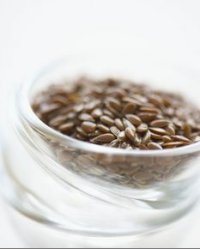"Fennel":
The Uses and Nutrition Facts of This
Delicious Antioxidant, Vitamin C
Powerhouse Vegetable
© 2013 Health Realizations, Inc.
Now is a perfect time to add some fennel -- the crunchy, subtly licorice-flavored veggie -- to your springtime menus, as its prime season is just wrapping up. If you've never tried fennel, you've surely noticed it, as its shape is unlike any other vegetable.
|

Fennel has a texture similar to celery with a somewhat sweet, licorice-like flavor (that gets a bit nuttier when it's roasted).
|
Fennel has a pale green bulb from which celery-like stalks tipped with feathery leaves grow. Every part of the plant, from the bulb to the seeds, is edible and quite delicious, but the best reasons to use fennel in your cooking are hidden beneath its surface.
Four Healthy Reasons to Eat Fennel
Fennel is full of beneficial nutrients including vitamin C, fiber, potassium, manganese, folate, niacin, phosphorous, calcium, magnesium, iron, and copper. It also provides these other good-for-you benefits:
-
Amazing Phytonutrients: The phytonutrients in fennel -- rutin, quercitin, anethole and more -- have been found to reduce inflammation, help prevent cancer and protect animal livers from damage caused by chemicals.
-
Antioxidant Protection: The fennel bulb is loaded with vitamin C, an antioxidant that helps protect your body from free radical damage (more about related oxidative stress -- and how to avoid it follows below), is antimicrobial and helps keep your immune system functioning effectively.
-
Fiber: Fennel is a good source of fiber, which may help to reduce cholesterol levels and remove cancer-causing toxins from your colon.
-
Folate: Fennel is also a good source of folate, a B vitamin that helps convert the dangerous homocysteine molecule (which can increase your risk of heart attack or stroke) into a harmless compound.
Fennel Has Been Enjoyed Since Ancient Times
Today fennel is usually associated with Italian foods and is cultivated in the United States, France, India (where it's used as an after-dinner breath freshener and digestive aid) and Russia, but in ancient times it was grown in Europe, the Mediterranean and the Far East.
|

Fennel seeds make a rich addition to soups, salads, stews and sauces.
|
The Greeks called fennel "marathron," because it grew on the battlefield of the same name, and revered it for its medicinal and mythic purposes. Meanwhile, in medieval times, fennel was used to ward off witchcraft and evil, and in Puritan times fennel seeds were called "meeting seeds," and were chewed during gatherings.
How to Use Fennel
The bulb, stalks and leaves of fennel can all be used in cooking, and it's simple to prepare. Simply cut the stalks from the bulb, remove the leaves and chop into the size you need. The bulb and stalks make an excellent side dish sautéed with onions, or they can be added to soups, stews and even used raw on sandwiches and salads. Fennel leaves work best as a seasoning for fish, plain yogurt, soups and stews.
If you've never tried fennel before, or if you've been looking for a new fennel dish, the following recipes are simple to prepare and hard to resist!
Roasted Fennel
Ingredients:
- 2 fennel bulbs, stalks cut off, bulbs sliced
- Olive oil
- Balsamic vinegar
Method:
- Preheat oven to 400°F.
- Rub just enough olive oil over the fennel to coat. Sprinkle on some balsamic vinegar, also to coat.
- Line baking dish with silpat or aluminum foil and lay out pieces of fennel
- Roast for 15-20 minutes, until the fennel is cooked through and beginning to caramelize.
Shaved Fennel Salad
Ingredients:
- 1 fennel bulb, shaved paper thin with a mandoline or meat slicer
- 2 Tbsp extra virgin olive oil
- 1 Tbsp fresh lemon juice
- 1/8 teaspoon of chopped fresh thyme leaves
- 1 Tbsp chopped flat-leafed parsley
- 2 Tbsp shaved Parmesan cheese
Method:
- Mix all ingredients together and serve.
Importance of Understanding Oxidative Stress (including above noted "free radical damage") -- and How to Avoid It (including above: Eating Fennel)
Oxidative stress is now recognized as a leading cause of chronic disease and aging. It occurs when free radicals -- toxic oxygen molecules produced by normal body processes but also via external sources like stress and pollution -- spiral out of control.
|
.aspx?width=168&height=250)
Antioxidants from healthy foods like fruits and vegetables are still your best line of defense against oxidative stress.
|
Even the healthiest among us have free radicals in our systems. However, free radicals are normally kept under wraps where they cannot cause great harm to the body. When free radicals exist in your body in excess, the harmful condition known as oxidative stress occurs.
"There is evidence that free radicals are a predominant factor in the etiology of a wide range of diseases and conditions such as cancer, diabetes, atherosclerosis, Alzheimer's disease and rheumatoid arthritis," says free radical and antioxidant expert Li Li Ji, Ph.D. of the University of Wisconsin in Madison.
How Free Radicals Take Over Your System
There are two major ways that free radicals can overwhelm your body. One is that you've been exposed to an abundance of them due to environmental pollutants and other toxins, including:
- Cigarette smoke
- Alcohol
- Automobile exhaust
- Air pollution
- Bacterial, fungal, or viral infections
- Asbestos
- Radiation
The other is that your body is lacking in the healthy compounds it needs to fight free radicals: antioxidants. Antioxidants can be vitamins, minerals or enzymes, and they exist in foods and certain supplements. Because most Americans do not eat healthy diets -- ones that include fruits, vegetables and other whole foods -- and instead eat diets rich in processed fast foods, many of us are seriously lacking in these health-giving compounds.
In reality, most of us experience a combination of these effects in daily life. In other words, your diet may not be the best and you're also exposed to regular second-hand cigarette smoke and alcohol during your daily happy-hour meeting with co-workers, or to exhaust fumes on your drive home. The result is most assuredly oxidative stress.
Mental Stress Leads to Oxidative Stress
Your emotions and exposure to external stress also impact the amount of oxidative stress going on in your body. Take one study of 39 women, aged 20 to 50, who had been experiencing extreme, ongoing stress while caring for a chronically ill child. When compared with 19 similar women who were not undergoing stress, the stressed women had significantly higher levels of oxidative stress in their bodies.
This oxidative stress, the researchers pointed out, damages DNA, including telomeres, the caps at the ends of chromosomes that carry genes. As we age, telomeres naturally shorten and die; however, chronic stress accelerates this process. As increasing numbers of cells reach the end of the telomeres and die, physical symptoms of aging appear, including:
- Weakened muscles
- Wrinkles
- Fading eyesight and hearing
- Organ failure
- Diminished thinking abilities
"Everybody's trying to figure out what causes aging and premature aging. We all know that stress seems to age people -- just look at the aging of our presidents after four years," said Dennis H. Novack of Drexel University College of Medicine, who studies the link between emotions and health. "[The study] demonstrated that there is no such thing as a separation of mind and body -- the very molecules in our bodies are responsive to our psychological environment."
The Toll of Oxidative Stress on Your Body
Aside from being a direct influence on the way your body ages, oxidative stress has been linked to a wide array of diseases, including:
- Heart disease
- Hypertension
- Cancer
- Acute respiratory distress syndrome (ARDS)
- Asthma
- Inflammatory bowel disease (IBD)
- Arthritis
- Diabetes
- Alzheimer's disease
- Parkinson's disease
- Huntington's disease
- Lou Gehrig's disease
- Autism
- Stroke
Oxidative Stress: Tips for Fighting Back
Although we all experience some level of oxidative stress -- it's normal and, in fact, necessary for our very existence -- this does not mean that you must sit idly by and let an excess level do its damage. Here are four key ways to help prevent oxidative stress and all of its related conditions:
-
Eat an antioxidant-rich diet. Antioxidants help prevent oxidation, but you must fortify your diet with them by eating fennel, fruits, vegetables, nuts and other whole foods regularly to get the benefit.
- Exercise sensibly. Exercise does, in fact, cause oxidative stress in your body, which is why doing too much of it, or at too strenuous a level, can do your body more harm than good.
However, "If you build your fitness level gradually, your body's antioxidant defenses will improve faster than the rate at which free-radical generation increases," says Alex Sevanian, Ph.D, professor of pathology in the department of molecular pharmacology and toxicology in the School of Pharmacy at the University of Southern California. "Exercise enhances the body's ability to handle stress more than it harms the body through stress."
|
.aspx?width=168&height=250)
Exercise does create oxidative stress, but while too much may be harmful, the right amount will improve your health in the long-run.
|
- Consider chiropractic wellness care. People who have received chiropractic care had higher mean levels of serum thiol, primary antioxidants that serve as a measure of health status, than those who received no chiropractic care, according to a study in the Journal of Vertebral Subluxation Research.
"Going through life, we experience physical, chemical, and emotional stress. These stresses affect the function of the nervous system. We hypothesized that these disturbances in nerve function could affect oxidative stress and DNA repair on a cellular level," said Dr. Christopher Kent, one of the study's authors. "Chiropractic care appears to improve the ability of the body to adapt to stress."
-
Take time to relax. A stressful, anxiety-filled daily routine will wear you down, no matter how healthy your lifestyle may otherwise be. Said Elissa Epel, a psychiatrist at the University of California at San Francisco (UCSF) who helped conduct the telomere study mentioned above, "The findings emphasize the importance of managing life stress, to take it seriously if one feels stressed, to give your body a break, and make life changes that promote well-being."
Sources
The World's Healthiest Foods
Simply Recipes
Study Confirms That Stress Helps Speed Aging
Oxis Research
Men's Fitness: Winning Against Free Radicals
Medical News Today: Chiropractic Influence on Oxidative Stress and DNA Repair
